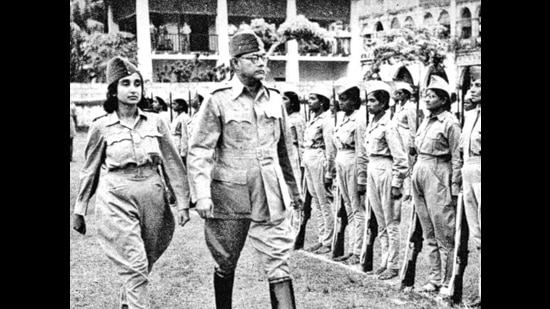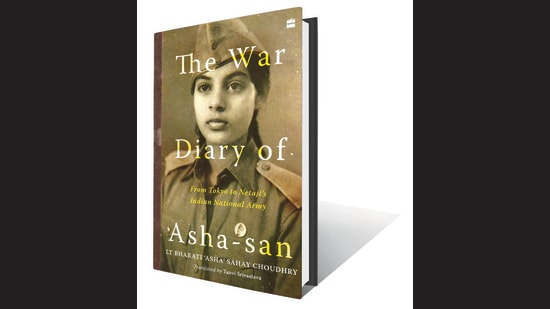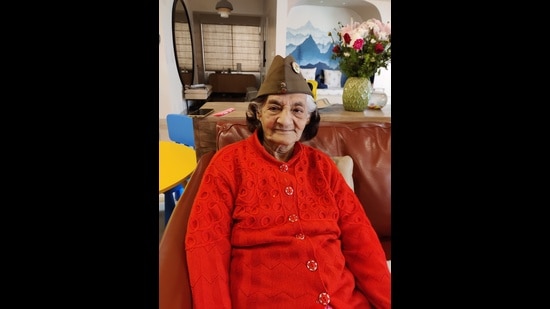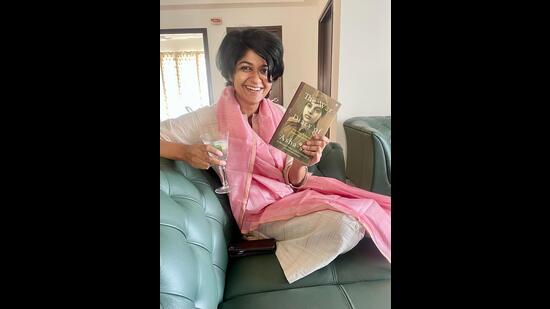Review: The War Diary of Asha-San by Lt Bharati ‘Asha’ Sahay Choudhry
The simple diary entries that comprise this book are rare accounts of the diaspora’s role and of women’s participation in India’s freedom movement
Lt Bharati “Asha” Sahay Choudhry or Asha-san’s war diary is an engaging account of her teenage years when she joined the Indian National Army’s (INA) Rani of Jhansi Regiment to overthrow the British Raj.

Born in Kobe in 1928, Asha-san (san is an honorific suffix meaning “dear” in the Japanese language) wrote this evocative account of her teenage years in Japanese, her first language. In 1972, she rewrote her war memoirs in Hindi – “from scraps of paper” and from memories of her “tumultuous teenage years in Japan”. Asha-san is currently 94 years old and lives in Patna with her son, Sanjay. Her diary has been translated into English by her granddaughter-in-law Tanvi Srivastava.

Asha-san’s parents were Indian expatriate freedom fighters who fled to Japan in the 1920s. Her father Anand Mohan Sahay was a minister in the cabinet of the Azad Hind Government and a close confidant of Netaji Subhas Chandra Bose. Her mother Sati Sen was the niece of political activist and lawyer Deshbandhu Chittaranjan Das. It was Sati who embarked on a difficult journey to India to meet Bose and convey her husband’s plan to get Bose to Japan via Germany to lead the freedom movement in East Asia.
She single-handedly raised her children in tough conditions, especially when America was bombing Japan, and her husband was away on secret missions. The times Sahay visited the family for short intervals, usually in Bose’s company, he sang nationalistic songs to his three children, Asha-san being the eldest.
Growing up on stories about British atrocities on Indians and charged by Bose’s fiery speeches, Asha-san decided to join the struggle for India’s independence. When she heard Bose’s speech at Tokyo University saying he was a follower of Mahatma Gandhi but he disagreed with his concept of Satyagraha or non-violent resistance, she urged her mother to speak to Bose to let her join the INA. She was ready to give her blood for the country.
At 17 (in March 1945), she joined the Rani of Jhansi Regiment, the women’s regiment of the INA. Her diary entries, which begin in June 1943, are moving accounts of life in war-torn Japan, and provide insights into Bose’s leadership in the Far East.
Her entry dated August 10, 1943, gives the reader goosebumps: “From the ration shop we get enough to eat, even if it is only pumpkin day after day. We’ve been eating boiled pumpkin for the last three months. We’ve heard we’ll get potatoes next time. We often get to hear things like this…” She writes about her mother bartering a cotton sheet for rice, as American planes flew over them dropping bombs, and saying she didn’t need anything when Bose asked her if she needed money.
Asha-san’s journey from Japan via Taiwan to Thailand to join the INA was in itself full of adventure. While on her way from Hainan to Oryu, her plane was spotted by the enemy. As everyone on board prepared for their end, the Japanese pilot dropped the plane to the same level as the ocean and saved their lives. Later, like a true Japanese, he apologised for causing inconvenience to his passengers.
These simple diary entries are rare accounts of the diaspora’s role in India’s freedom movement: “Today is Netaji’s birthday. In Burma, much against his wishes, Netaji is weighed in gold. This gold will be kept for the INA. Young Indian men and women in Malaya, Thailand and Burma are establishing a ‘Suicide Corps’ by signing their names in blood.”
One of the earliest revolutionaries who had used foreign soil, including Japan’s, to attack the British colonisers was Maulana Barkatullah, a method later replicated by Bose.
Asha-san’s diary fills in gaps on the role of women, who silently backed these revolutionaries. She candidly writes of her brave mother being tailed by the CID when she was in Calcutta to meet Bose and almost being offloaded from the ship on her way back to Japan, or the time she sheltered INA pilots. She also writes of other courageous women, often unnamed — “women of Rangoon are handing over whatever remaining jewellery they had to Netaji”.
Though Asha-san underwent arduous training to join the war front in Imphal to liberate her motherland from British control, she didn’t really go to war. Hiroshima and Nagasaki were bombed with nuclear weapons and the Japanese forces were forced to surrender. The plane carrying Bose, who was on his way to Tokyo following the bombings, crashed. The game was over for the INA.
Asha-san’s diary entries on Bose’s life and his untimely end are insightful and intriguing. She writes about Bose gently scolding her mother for touching his feet.
“What is this, Sati? What have you taught the children? Do we still have to bow our heads in front of others? And touch their feet, too? Is slavery still around?”
When Bose died, his ashes were brought to Sati in Tokyo by Colonel Habib ur Rahman and AS Ayer. “Habib Bhai said: ‘Sister, I have brought Netaji. What shall I do with him?’ I said: ‘For Netaji and for those who loved him, the door of the Sahay house is always open.’ They all came inside. Habib Bhai placed the urn in the showcase of our living room. We lit incense sticks and paid our respects… On 18 September, we took Netaji to Renko-ji Temple.”
Sahay and Asha-san were given safe passage to India in 1946. She was reunited with her mother and siblings in 1947.

The diary is divided into three parts. For Srivastava, translating this book was “a fortuitous accident”. With this translation, she discovered not only the extraordinary world of the Azad Hind Government but also a translator in herself. “It was a privilege to research the Indian National Army and to learn about young men and women like Asha-san who sacrificed everything for Netaji’s idea of independent India — an inclusive, pluralistic India,” she writes.
Although this is a partisan account of war as seen from a teenager’s point of view, her fierce love for both India and Japan cannot be missed. When she sees some Japanese prisoners honouring the lives of American soldiers — their enemies — a reply from a Japanese prisoner of war stuns her: “Friends and enemies exist here — not in the other realm. They have fulfilled the duty for their country — as have we. It is natural to pay tribute to all patriots.”

The diary entries are not without humour. Asha-san, who spoke only Japanese, was being taught English and Hindi by her father on her way to Thailand. She writes: “To be honest, anything, including a bomb falling on my head will be easier than learning how to write Hindi.”
When she is offered “makki ki roti” by an Indian family, she thinks it is a roti made of flies!
Most of all, Asha-san’s diary is an important read on the role of women in India’s freedom struggle, which is unfortunately largely undocumented. Although this diary is about Asha-san’s travails, it is, in equal measure, a portrait of her heroic mother Sati Sen.
Lamat R Hasan is an independent journalist. She lives in New Delhi.



